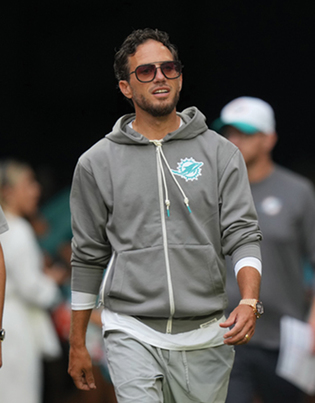
Peter Joneleit/Icon Sportswire via Getty Images
Mike McDaniel ’05, now head coach of the Miami Dolphins, knew he wanted to get into coaching by the time he graduated. But he credits Yale for giving him the educational space to explore his options.
View full image
Mike McDaniel ’05 was a walk-on wide receiver at Yale, but now he paces the sidelines as head coach of the Miami Dolphins, the third Yale alumnus to hold an NFL head coaching job. (The first two: Charley Ewart ’38 and Dick Jauron ’73.) After graduation, the Denver-area native took an internship with his hometown Broncos and then climbed the coaching ranks, earning the Miami job in 2022. The Dolphins have made the playoffs in each of his first two seasons at the helm.
Evan Frondorf: When you were a student-athlete at Yale, what did you imagine yourself doing? Was coaching on the horizon even then?
Mike McDaniel: Coaching was always first and foremost, but I made sure that I did right by my educational opportunity to explore every avenue and really be convicted in that career choice. What does that mean? That meant that I was really looking into all potential aspects of career paths, and I was very open-minded. I explored some business avenues, took a range of classes across a variety of topics, and ultimately was very, very convicted by the time I was graduating that I wanted to get into coaching. And as much as I wanted it to be, investment banking was not my passion.
EF: What did you take away from your time at Yale that helps you on the sidelines?
MM: I think Yale taught me a lot about working with people from different backgrounds, interests, and walks of life.
It was eye-opening to me when I arrived on campus to have so many people passionate about so many different things. It is truly a melting pot of ethnicities, socioeconomic backgrounds, and interests, which also resembles an NFL locker room. I also learned a great deal about the pressure that many young people face—many kids that get to Yale feel the weight of having to succeed at the highest level. They’re often the chosen ones of their family or their class, and there are similarities to how NFL players often feel in terms of the weight and pressure they carry.
It’s a unique burden. I believe I am a better leader and coach because of my time at Yale or for how it allowed me to grow in both my understanding of people and their unique journeys, and my ability to relate to them with empathy.
EF: You’re known for breaking the NFL coaching mold with your play-calling and personality. What do you think it takes to be successful in the NFL today?
MM: To be successful in the National Football League, you have to have a strong bond with a lot of people and lean on others. It’s a team sport for a reason, and that includes the coaching staff and support staff—you have to have a lot of people who are pulling in the same direction. It’s not something you can accomplish on your own. There are many aspects to the job that take resolve and complete immersion, and you have to trust that others are doing their job so you can focus and problem-solve in whatever way the team needs.
EF: [Yale head coach] Tony Reno was your receivers coach while you were a Bulldog. What are your thoughts on his success as a head coach at Yale over the last decade?
MM: It’s very impressive, especially knowing how competitive the recruiting pools are. And I know that he’s done a good job recruiting, because when I was there, we never beat Harvard, not once. I was in one of the classes that was 0-for.
Ultimately, it’s cool to see him be the same coach now as a head coach. I remember him as the position coach that constantly pushed me to be my best self.
EF: Finally, last season, you faced Kansas City in a playoff game where it was minus-four degrees at kickoff. Though you’re in Miami now, how did the New Haven winters prepare you?
MM: To be honest, I remember thinking on the field, “I haven’t been this cold since walking to 6:00 am offseason runs at the fieldhouse back in the February, March months of New Haven.” I thought I knew cold weather growing up in Denver, but when I got to Yale, I remember thinking that 26 degrees felt like negative 5. And I remember some mornings where the temperature was just about what it was in Kansas City—so I did think about that.
 loading
loading